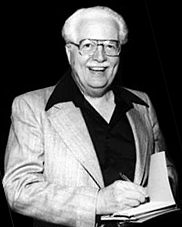
|
Autarchy Versus Anarchyby Robert LeFevre
Rampart Journal of Individualist Thought (1965)
|
An Unknowing Anarchist?
I recall distinctly the occasion on which I was first accused of being an anarchist. My publisher was entertaining in his home, and among the guests was a college professor who had read some of my essays and editorials on the subject of human liberty.
The position I had taken in those writings was original to me. Without a doubt, what I had written had been said before in other ways. Certainly, my reading had contributed to the formation of a point of view in which I rejected the idea that any man had a right to impose upon me by force. But although I must have been influenced toward them, I had not at that time read anything that provided me with my conclusions.
I had stated, and in my exchange with the professor I repeated, my antipathy to the state as an agency of force. I declared for economic freedom; the fundamental idea that each man ought to be free to produce and enjoy the product of his labor. I believed this freedom should not be impaired, even fractionally, by other men acting within a formalized agency of force.
To my amazement, the professor said: Why, you're an anarchist.
The word had an unpleasant sound. I denied the classification automatically.
But you are,
he insisted. You may not know it, but you are an anarchist.
Weren't anarchists people who went around inflicting terror and imposing force on others? Weren't they the ones who believed in throwing bombs and shooting people? I was repulsed by the thought that anyone could confuse my insistence on non-force with people who apparently advocated a use of force. But I had not at that time read the writings of the anarchists, and I confessed this shortcoming to the professor.
You should find out,
he advised kindly. You are just an anarchist who doesn't know it yet.
That evening I went to the Britannica as the most readily available source of information and found a summation of the subject. As I read the first few paragraphs, my heart leaped. The professor had been right. Here, in far more concise terms than I had ever found, was apparently what I believed.
ANARCHISM, the name given to a principle or theory of life and conduct under which society is conceived without government ... harmony in such a society being obtained, not by submission to law or by obedience to any authority, but by free agreements concluded between various groups, territorial and professional, freely constituted for the sake of production and consumption, as also for the satisfaction of the infinite variety of needs and aspirations of a civilized being. In a society developed along these lines, the voluntary associations which begin to cover all the fields of human activity would take a still greater extension so as to substitute themselves for the state in all its functions.[1]
The next few paragraphs were of similar import. Then came the subhead, Anarchists and the State,
and within a few sentences I was disillusioned. I not only was not an anarchist, I rejected their economic doctrine, and had been opposing it right along without even knowing that what I opposed was the anarchist economic view.
As to economic conceptions, the anarchists, in common with all socialists, of whom they constitute the left wing, maintain that the prevailing system of private ownership in land, and our capitalist production for the sake of profits, represent a monopoly which runs against both the principles of justice and the dictates of utility. They are the main obstacle which prevents the successes of modern technics from being brought into the service of all, so as to produce general well-being.[2]
Years of personal involvement in business, news analysis and commentary, and study of what is known as the Austrian school of economics, had convinced me that free and private enterprise was the mainstay of organized society. I favored orderly and peaceful procedures as advocated by the anarchists in the first paragraph which describe their political theories, but I wholeheartedly opposed any attempt to impose some kind of regulatory or confiscatory force uponthose who own property, regardless of the kind or amount of property owned.
As I saw it then, and as I still see it, the anarchist philosophy is internally contradictory. It professes a sparkling and shining individualism, at which point I warm to the arguments. Then it advocates some kind of procedure to interfere with the processes of a free market, e.g., elimination of interest and rents; denial of the right of a man to own land, or to own land beyond some stated amount; abolition of profits; placement of management control in the hands of workers through democratic processes conducted within factories, and so on.
To quote the Britannica again:
The anarchists consider the wage system and capitalist production altogether as an obstacle to progress. But they point out also that the state was and continues to be the chief instrument for permitting the few to monopolize the land, and the capitalists to appropriate for themselves a quite disproportionate share of the yearly accumulated surplus of production. Consequently, while combating monopolization of land, and capitalism altogether, the anarchists combat with the same energy the state, as the main support of that system, not this or that special form, but the state altogether, whether it be a monarchy or even a republic governed by means of the referendum.[3]
Possibly as good a summation of the anarchist view as is available was provided by a manifesto adopted by the Anarchist International in Geneva in 1882:
Our ruler is our enemy. We anarchists, i.e., men without any rulers, fight against all those who have usurped any power, or who wish to usurp it. Our enemy is the owner who keeps the land for himself and makes the peasant work for his disadvantage. Our enemy is the manufacturer who fills his factory with wage-slaves. Our enemy is the state, whether monarchical, oligarchical, or democratic, with its officials and staff of officers, magistrates, and police spies. Our enemy is every thought of authority, whether men call it God or devil, in whose name the priests have so long ruled honest people.[4]
Shortly thereafter, I wrote an essay setting forth the fact that while I agreed with the anarchists on their antagonism to state authority and on the merit and primacy of the individual, I rejected their arguments in other areas.[5] It was my contention that a man must be free to acquire honestly all the property he can or will, to use it or abuse it as he pleases, once it is his; that he must be free to worship as he pleases or not to worship at all; and that the imposition of force upon him when he is peacefully and harmoniously carrying out his own objectives is destructive of the productive and creative capabilities of the individual.
The accusation that I am an anarchist has continued sporadically. Usually the term is tempered with the qualifying adjective, philosophical.
A careful check of the writings of those anarchists, both European and American, who have earned this badge of identification leaves me outside their fold. In each case, I find those, so-called, engaged in stating the necessity of some kind of economic intervention or in downgrading some of the conditions which are essential to the operation of a free market. While many of them (Proudhon, Tolstoy, Tucker, Warren, etc.) take a position similar to mine in respect to the evils of state controls imposed upon the creativity and productivity of the individual, they defeat themselves, in my judgment, by calling for arbitrarily imposed or voluntarily accepted extra-market restraints upon property and its ownership.
The lines of thought which have been aired by writers who come under the anarchistic canopy are so many and so contradictory that a whole series of hyphenated terms has been used to designate the various kinds of anarchists. These include individualist anarchists, philosophic anarchists, communist anarchists, union (syndicalist) anarchists, Christian anarchists, and nihilist anarchists.
These qualifications even go to secondary modifications in which there are anarchists who, to accomplish their goals, favor education only, or defensive violence, or passive resistance, or aggressive violence, and so on. In view of all these urgings it becomes questionable whether the term anarchy can find useful employment as a word to identify a particular point of view.
In his excellent study on American anarchists, Dr. James J. Martin states that the term has such ambiguities that today, to many if not most Americans, anarchy simply means disorder, destruction, and chaos.[6][7]
Indeed, my first reaction when I heard myself classified in this manner was a feeling of shock because I, too, had tended to suppose that anarchists were black-bearded radicals carrying bombs and daggers, and intent upon assassination, demolition, and other violent procedures.
Anarchy derives from the Greek. The prefix, an, denotes not or without. Archy denotes rule or ruling. Thus, anarchy means without rule. And in the hyphenations which have proliferated, it appears that few if any wish to be known simply as anarchists. Each person who will accept the label anarchist today probably has in mind a qualification of his position.
It would follow that a word in general usage which cannot be precisely applied to any particular person or doctrine without some type of explanation or modification, is more handy as a term of opprobium and scorn than otherwise.
Personally, I deplore the negativity implicit in the idea of no rule.
All men are ruled by some one or some thing. The implication of no rule
is that men are released from all control, all restraint, even all morality, purpose, or responsibility. Such is not desirable. Nor is it possible. As Rose Wilder Lane says in The Discovery of Freedom:
All energy operates under control. Whether it be the energy of an electron, a hurricane, or a man, energy is controlled.Living energy is different; it is creative, and variable. It changes ... Yet living energy is controlled ...[8]
This fact makes scientific knowledge possible. Non-living energy - electricity, for example - always operatesi n the same way in the same conditions. No one knows what controls it, but because it is controlled, men who have observed how it acts can predict, with sufficient accuracy, how it always will act.(¶ 26)
Thus, the idea of no ruler
must be applied within a limited framework if it is to have any meaning at all. Realistically, each person rules himself. Anarchy might well imply the absence of self-control, yet even the anarchist controls himself in terms of his own beliefs and aims.
Many persons who think of themselves as anarchists, in the sense that they oppose external political control of their property and actions, are seeking a realistic framework in which they can control their own creative and productive procedures. Many other people deprive themselves of entrance into an area of inquiry which would be inspiring to them because the doorway has been labeled anarchy,
which they reject as it is equated in their minds with violence and destruction.
Nearly everyone today, at least in America, agrees that government of the political variety, and especially the government in Washington, D.C., is far larger, more costly, and more obtrusive than is desirable. As they urge reduction in size or elimination of certain government functions, they are essentially calling for the curtailment of certain powers in the hands of bureaucratic rulers, or even for the creation of areas void of bureaucratic rulers. This trend is as anarchistic, to the degree that it persists, as any other call for the elimination of a ruler in any area or all areas. Yet most do not wish to see disorder, lack of direction, or confusion, a condition they would identify as anarchy.
 Personally, I do not want a condition of no rulership. I want a condition in which each man is the absolute ruler of himself and all he rightfully possesses. If this is desirable, then it follows that I must direct my energies so as not to impose my will on others even though they may be imposing their wills on certain properties not their own, or on persons other than themselves. I must not seek to become their ruler even as I cannot condone their efforts to rule me and what is mine.
Personally, I do not want a condition of no rulership. I want a condition in which each man is the absolute ruler of himself and all he rightfully possesses. If this is desirable, then it follows that I must direct my energies so as not to impose my will on others even though they may be imposing their wills on certain properties not their own, or on persons other than themselves. I must not seek to become their ruler even as I cannot condone their efforts to rule me and what is mine.
If a word can be found to convey the meaning I intend, it must mean self-rule; the absolute sovereignty of the individual over himself and all that belongs to him.
Fortunately, there is such a word. It is autarchy.
The prefix, auto, means self. Archy, as we know, means rule or ruling. Autarchy then means self-rule, or the act of self-ruling.[9]
Since I favor total self-control - absolute government of the individual over himself - I believe autarchy more accurately describes, in a positive fashion, the kind of situation I consider most desirable. Some dictionaries define autarchy as a kind of tyranny or despotism, but of necessity it is limited to self-application. Thus, an autarchist may very well be a tyrant over himself, or he might appear tyrannical by refusing to admit others into the sacred precincts of his own mind, person, or property. But if it is tyranny to reject the sycophant, the panhandler, and the central planner, then this kind of tyranny is not reprehensible, to my view.
With the aid of this word to describe a desirable condition of independence, it is possible to explore the anarchistic convolutions of thought and to escape a general advocacy of anarchy while approving some of the philosophic aspects of the doctrine.
Anarchy as it has been advocated in Europe and America contains both socialist and autarchist characteristics. The anarchist is correctly included in the socialist movement because of his central purpose of intervening in the economy. Essentially, the anarchist view is predicated upon both philosophic individualism and economic tampering.
Some autarchists identify themselves as anarchists, but definitively should not be so designated. The peaceful individualist who upholds private ownership of property as a total concept and who sees no merit in the organized coercion of the state, cannot in justice and in common sense be lumped into the same category as the man who opposes property ownership in any of its ramifications and will either violently or peacefully abolish the state in order to collectivize property at any point. Contemporary statists and anarchists (both socialists) apparently believe liberty and anarchy are synonymous. The contrasts provided by the two words are too vast and too basic to crowd them under the same etymological umbrella.
Sharp analysis and direct and pungent verbiage against the state are not the mark of the anarchist per se. An anarchist is an economic interventionist and the efforts of all properly identified anarchists support this assertion.
Traditional anarchistic thinking is inextricably linked with the view of property ownership as evil. Implicit also are the labor theory of value and the concept that anyone who receives profits, rents, or interest is a usurer since such payments are made, not on the basis of labor but on the basis of surpluses which should have gone into the hands of the laborers. Various modifications have developed in contemporary anarchistic thinking.
Few other writings in support of individualism contain the inspiration and philosophic insight of certain anarchists. In this regard, nearly every anarchist of note can be recommended. Yet, if the individualist supports individualist doctrines exclusively and does not favor economic intervention, we should not include such a person within the anarchist structure.
There are a number of famous individualists who escape the general accusation that they are anarchists, by virtue of their preeminence and fame as individualists, even though from time to time they may have inveighed heavily against private property or remained critical of the concept of freedom in economic affairs. In this regard we might be justified in referring to Marcus Aurelius, the dictator of Rome, as a philosophic anarchist, and to Epictetus as an individualistic anarchist, although both are properly listed as stoics. If we were to brand as an anarchist every person who provided fundamental individualist thought and at the same time attacked a completely free market, we would have to include even such famous Americans as Thomas Jefferson and Abraham Lincoln, who both attained the presidential position, thus denying political anarchy, yet whose statements provide milestones in the development of an individualist point of view.
The Autarchists
Autarchy as separate and distinct from anarchy is a relatively current development and perhaps cannot fully be shown as an independent line of thought until it is able to throw off the intellectual shackles attached to it by scholars in the field. Those who wish to preserve the term anarchy as a useful means of identifying anti-statists will be eager to add the names of autarchists to the roll of anarchists, either to extend the latter's influence by placing the names of eminent men within the socialist framework, or to discredit antistatists by linking them with a questionable doctrine. But the line of demarcation should properly be drawn between antistatists who are socialists and antistatists who are in favor of private capitalism.
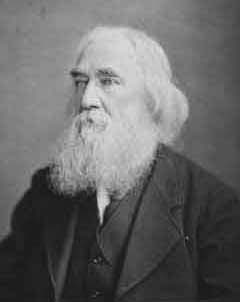
Lysander Spooner
Father of Modern Autarchy
It is the purpose of this paper to begin the process of this essential cleavage. I will insert the wedge by introducing the man who, in my judgment, might be called the father of modern autarchy, Lysander Spooner (1808–1887). Spooner has often been listed as an anarchist and there is some justification for this classification. Although this famous antistatist reserved nearly all of his talent and energy for criticism of the state, he does reveal occasionally that he was deeply influenced by anarchistic reasoning in respect to his economic position. For example, Spooner says in regard to contracts, If a man contracts to perform what proves to be an impossibility, the contract is valid only for so much as is possible.
As Dr. Martin shows, this means that a debt had no legal obligation, and usually no moral one, beyond the means and ability of the debtor to pay at the time the debt became due.
[10] Spooner does set this problem into the market place by suggesting that it is up to the creditor to gauge the risk of the loan before making it. But elsewhere he decries the fact that bankers and others who lend money, tend to furnish lower interest rates to those who are obviously good risks.
Also, there is some evidence that accumulations of capital in large amounts worried Spooner. According to Martin, he believed subversions of natural justice and natural law grew from an attempt of a portion of mankind to live off the production of the remainder, and extended as far back in history as the period when the systematic cultivation of the soil made possible an accumulation of material wealth in excess of that needed for daily needs on the part of the cultivators.
[11]
Spooner was a noted lawyer in Massachusetts, an authority on the Constitution, a prolific writer, an abolitionist, a critic of legislative processes. In tracing the origin of liberal and radical thought in America, Rudolf Rocker refers to him as a most militant champion of individualistic anarchism.
[12]
In 1884 he established a private post (the American Letter Mail Company) to prove that a five-cent postage rate was sufficient whereas the government monopoly charged from twelve and one-half to twenty-five cents, and to oppose what he considered an infringement on the rights of free speech as guaranteed by the Constitution.[13][14]
His important works include:
- The Unconstitutionality of Slavery
- Trial by Jury
- Poverty: Its Illegal Causes and Legal Cure
- Letter to Grover Cleveland
- Natural Law or the Science of Justice (only Part I extant)
- No Treason: The Constitution of No Authority
- A Letter to Thomas Bayard
- economic pamphlets
- and others
In all probability, Spooner believed in the labor theory of value. Theories of Menger, Böhm-Bawerk, and others became available during his lifetime, but it is doubtful that he was acquainted with this literature. Spooner at times indicates that he is no enemy to wealth, and certainly no enemy to private ownership of property. But again he cavils at large capital reserves, feeling apparently, as so many do who do not grasp the full significance of free market economic theory, that large capital must have been accumulated dishonestly or by political favoritism. He reserves his sharpest rebukes for those persons in the market, such as bankers, who insist on dealing with the state. But his economic deviation is so slight as compared with his overwhelmingly effective stance against the state that I elect to think of him as fundamentally autarchic rather than basically anarchistic. Indeed, it could be held that Spooner had no larger socialist leanings than Adam Smith, whose Wealth of Nations, while in the main laissez faire, nonetheless contained the basis for continuing error in respect to value, thus furnishing Ricardo, Marx, and others with the raw materials for the socialist edifice.
The bridge between Spooner and modern-day autarchists was constructed primarily by persons such as H. L. Mencken, Albert Jay Nock, and Mark Twain. There are currently a number of schools of thought more or less widely known in the U.S. which are essentially autarchic since they favor a lassez-faire economic system and oppose the state at those places where in their judgment force is brought to bear to inhibit a free market.
Individualist Anarchists
Consensus finds William Godwin as the founder of the school of thought labeled individualist anarchism. This British subject (1756–1836) laid the intellectual foundations for organized anarchistic thinking. His major work, The Inquiry Concerning Political Justice, and Its Influence on General Virtue and Happiness (1793), took the view that all privately owned property is nothing but a mark of political favoritism. Property itself Godwin viewed as the source of all evil. Wars, murders, theft, slavery, extortion, violence of every description, stemmed from the idea of private property. If men were ever to have a society of justice and right, ownership of property would have to be proscribed. How could this be accomplished? Since, in Godwin's view, ownership was a political favor bestowed upon patronage recipients, the abolition of the state would abolish ownership.
His arguments in favor of a propertyless society, sans government, set into motion a tremendous revolution against the state. Probably Godwin was influenced profoundly by both individualist and collectivist writers. Doubtless, the American Revolution, as well as the French Revolution of 1789, played a part in the development of his point of view.
In America, working independently about the same time, Josiah Warren had no kind words for the state. He was the first of the individualist anarchists produced in this country. He viewed the ownership of certain types of property, notably the land itself, as a kind of political privilege bestowed upon favored individuals by the government. Further, his economic views were tied irrevocably to the concept of the labor theory of value. He favored labor certificates, as exchange premiums, in place of money. He opposed profits generally, nor did he favor rents or interest payments.
This view generally followed by other American individualist anarchists, of whom the best known was Benjamin R. Tucker (1854–1939). Tucker is placed prominently among 19th century American literary figures as a result of the outstanding periodical he published entitled Liberty. Tucker decided that the major problem was economic reform (in common with all other true anarchists) and that abolition of the state would follow such reform.[16] As he viewed it, the greatest criminal was the usurer. As far as Tucker was concerned, anyone who received profits, rents, or interest was a usurer, since all of these payments were made, not on the basis of labor but because of surpluses which should have gone into the hands of the laborers.

Henry George
The ultimate extent of individualist anarchy is probably found in the doctrines of Henry George (1839–1897). This exponent of land reform and the single tax
rolled up the most impressive following of any of the individualist anarchists, a following which is probably larger today than it was while George was alive. George favored the abolition of property in land, with all rents of land going to a central authority which would be the single proprietor of the land. George did not oppose profits or interest. He merely sought the abolition of private ownership of a single type of property, land itself. He viewed land ownership as a kind of monopoly.
Others of the individualist anarchanarchist school took much the same view. Thus, without question, even the Americans who followed the banner of anarchy were socialists to some degree, for their primary objective was economic reform of some type. Their methodology invariably included the reduction of the state to zero or near zero, either at once or following the accomplishment of certain economic interventions. The anarchist position was essentially contradictory because even though they sought the abolition of the state, the economic adjustments they sought would have to be accomplished by the state. Both George and Tucker (as well as a number of others) glimpsed the necessity and thus either favored a postponement of the abolition of the state until a more favorable moment, or compromised their position and agreed to a retention of the state in a minor capacity.
Count Leo Tolstoy, usually classed as a Christian anarchist, glimpsed such a contradiction in Henry George:
Where force is set up as law, there will slavery be ... as long as there shall be tyranny supported by the bayonet there will be no distribution of wealth among men, but all the wealth will go to the tyrants. A striking illustration of the truth of this position is afforded by Henry George's project of nationalizing land. George proposed to declare all land government property, and to substitute a rent-tax for all direct and indirect taxes. That is, everyone using land should pay the government its rental value. What would be the outcome? Land would belong to the government: to the English the land of England, to the Americans the land of that country, and so forth; that is, there would be slavery, determined by the quantity of land in use. Perhaps the condition of some laborers (such as agricultural) would be improved; but since there would remain the forcible collection of the tax of the rental values, there would also remain slavery. The land cultivator, in a bad year, not being able to pay the rent exacted from him by force, would have to enslave himself to the man with money in order to keep his land and not lose everything.[17]
Philosophic Anarchists
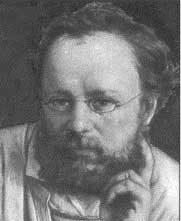
Pierre Proudhon
The earliest exponent of philosophic anarchy, a man who probably influenced the development of anarchistic thought more than any other person, was a Frenchman, Pierre Joseph Proudhon (1809–1865). Proudhon was a disciple of Godwin and of Rousseau, and others who favored either individualism or economic social reform. (¶ 59)
He modified the Godwinian view with respect to property. He viewed private ownership of property as essentially evil, but conceded that rightful use of property on an exclusive basis was probably necessary. Therefore, he suggested that proprietorship (the immediate use of property) was not evil although ownership per se was evil. If a man owned any property, he was in a position to remove it from all others, even if he was not using it at a given moment. This, as Proudhon saw it, was robbery.
But if the person did not really own
the property and merely held it as he used it, he was a temporary proprietor, and this was condoned. Proudhon is remembered for his most important work, What is Property? He is also remembered because he was the fountainhead from which the world's most famous socialist was first to slake his thirst for economic reform. Karl Marx began his career as a revolutionary as a disciple of Proudhon. His first writings were in unbounded praise of his master.
However, Marx sensed the fundamental ambivalence of anarchy and saw, correctly, that the anarchistic aim to abolish property ownership generally was out of harmony with the view that the state must be abolished. Marx's ambition was to found a world order outlawing private ownership of property, essentially the property of the bourgeoisie (productive property, the tools of production and distribution). Since it was inconceivable that those who owned such property would surrender it without a struggle, Marx recommended the conversion of government into a tool dominated by the workers (those who owned no property), the emergence of a dictatorship of the proletariat.
He agreed with the anarchist view that private property is nothing but a privilege extended by the state, but he viewed the immediate abolition ofthe state as wholly impractical. Rather, the state must become the tool of the workers through the employment of democratic processes.[18] The workers will always outnumber the owners. Thus, Marx broke with the anarchist school and established communism (modern socialism).
It is often claimed that Marx favored the ultimate abolition of the state. He is quoted as the author of the phrase that, following the revolution, in which the proletariat would seize power, the state will wither away.
There is some evidence that a verbal statement to this effect was expressed by Marx at a meeting of workers, largely anarchists, in which he sought to bring the anarchists over to the communist position. Lenin credits Engels with the statement.[19]
The anarchists, however, rejected the overtures of Marx or Engels. Their position was that communism would essentially fail to achieve both their objectives. They could see no reason why a powerful, totalitarian state would ever wither away.
Further, they took the position that the ownership of the tools by the state (the proletariat as ruling class) would merely provide a new group of owners and would not eliminate the ownership of property. They viewed state ownership of the tools of production as compared with private ownership of the tools of production as a distinction without a difference.
Although anarchists and communists both can rightfully be classed as socialists, they became, and remain today, steadfast enemies. When Lenin seized power in Russia, he ordered cannon turned against the anarchist headquarters, an offense for which the anarchists have never forgiven him. There is probably no more steadfast opponent of communism than the anarchist, even though he and the communist both seek to impose controls, restraints, or adjustments upon laissez-faire capitalism. As the anarchists view communism, it will lead to the abolition of human freedom. In this view they are corect. As the communists view anarchy, the system is impractical and both prongs of the anarchist objetive cannot be obtained. In this they are probably correct.
Communist Anarchists
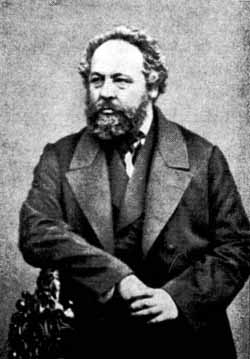
Mikhail Bakunin
The distinction of founding the particular branch of anarchy called communist anarchism falls to a Russian, Mikhail Bakunin (1814–1876). Bakunin began his career as a disciple of Marx within the communist structure. But as Marx had earlier broken with the anarchists, so Bakunin broke with Marx. In common with other anarchists he rejected the objectives of marxism (the creation of state capitalism in place of private capitalism) but in contrast to other anarchists he deplored the futility of peaceful propaganda by his co-workers in socialist reform. He openly approved of the methods of Marx which centered on political action of the most direct and, if necessary, violent nature. This appeared to him to provide the magic formula which anarchism had lacked up to that time.
To Bakunin goes the credit for introducing what is called the propaganda of action.
Since heads of state, heads of industries, bankers and financiers were all enemies,
Bakunin recommended direct steps to eliminate them. The pistol, the bomb, the dagger became symbols of communist anarchists. Assassination, demonstration, riot, and violence became the hallmark of their particular efforts. Terrorist acts against heads of state became the central theme of world news for three decades. Sophie Perovskaya assassinated Czar Alexander II in St. Petersburg on March 13, 1881. Santo Caserio, an Italian anarchist, assassinated S. F. Sadi Carnot, president of France, on June 23, 1894. Another Italian anarchist, Luigi Luccheni, killed Elizabeth, empress of Austria, on September 10, 1898. Monza killed Humbert I of Italy, July 29, 1900. On September 6, 1901, Leon Czolgosz assassinated President William McKinley in Buffalo, New York. There is a long list of similar terrorist acts, although many attempts were not successful. The overall result was to produce two different reactions.
Anarchists saw that this method did not obtain the results they sought. Each head of state was merely supplanted by another head. The murder of an industrialist did not abolish industry, it provided a promotion for a vice president.
Public reaction was one of revulsion. Prior to Bakunin, anarchist argument had fallen on many sympathetic ears. With the introduction of terror as a modus operandi, the anarchist wing of socialist reform lost ground. Regardless of whether people are distrustful of politicians or industrial leaders, this method is frightening and distasteful. It can be said that Bakunin's enthusiasm for direct action put the quietus on anarchy in large measure. It is from these excesses that the general view emerges which equates anarchy with disorder, riot, and chaos.
Prince Peter Kropotkin (1842–1921) was a follower of Bakunin. He spent much of his life in an effort to show that while revolution generally was the correct method for all social reformers, individual acts of terrorism were not implicit in anarchy. The effect of his work was to temper in some degree the wide antagonism that Bakunin had engendered. However, since he was an apologist for Bakunin and could not bring himself to abandon violence totally, he is classed as a communist anarchist.
The most dramatic of all the anarchist excesses occurred in Chicago. On May 3, 1886, communist anarchists and union anarchists were demonstrating outside the McCormick Harvester factory, following the proclamation of a general strike. Police were called in by the management and a riot ensued in which several workers were killed and others wounded. The next day at a union meeting at the Haymarket in Chicago, some 180 policemen forced their way into what had been reportedly a peaceful
meeting. A bomb was thrown into the police ranks. Six officers were killed and a number wounded. [Cf: Haymarket Riot]
The State of Illinois demanded immediate action and eight leading anarchists were rounded up for trial. Seven were sentenced to be hanged; the other given a fifteen-year prison term. Subsequently, four were hanged, one hanged himself in his cell, and three had their sentences commuted. Finally, the survivors were unconditionally pardoned. A re-examination of the evidence had failed to provide proof that any of the men sentenced had had anything to do with the bombing.
But by this time, journalists were depicting anarchists as small, black-bearded radicals carrying bombs and daggers.
Union anarchists
Without a doubt, it was the writings of Proudhon and Marx which inspired the formation of today's trade-union movement. In France, Spain, Italy, Portugal, and Germany, syndicalist societies were formed. The central theme of this active and aggressive body was that the workers should receive all income from the operation of their respective industries. Profits were viewed as surplus value
and were to be outlawed. Additionally, the chore of management was to pass into the hands of workers via the democratic process. Workers were to hold elections within their respective plants and elect their own managers from among their number. Then, within a given district, the democratic managers were to meet to establish quotas of production. The distinctive feature of anarchy - antipathy toward both the state and the capitalist - dominated the trade union movement until recently.
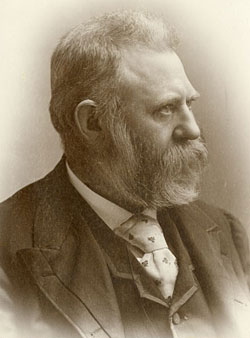
Johann Most
A German anarchist, John Joseph Most, came to New York City in 1882 and began an extensive program of propaganda through a series of publications: Arbeiter Zeitung, Alarm, The Voice of the People, The Anarchist. The Knights of Labor was organized to carry on anarchistic objectives in this country. Later, the IWW (International Workers of the World) was set up as a rival body, largely under the influence of the communist anarchists. The Knights of Labor evolved into the American Federation of Labor and took renewed vigor through the ministering of Samuel Gompers, who did a great deal to further anarchist goals. He brought respectability to the strike and the boycott, which became effective (and legal) techniques.
After World War I, the IWW lost ground and the AFL emerged triumphant. Its pre-eminence was challenged during the 1930s by the governmentally sponsored Congress of Industrial Organizations (CIO), which ultimately merged with the earlier body to form the present AFL-CIO. In process, laws were enacted which were prejudicially favorable to union anarchy, the most notable of which was the famous Wagner Act of 1935.
As government became the champion of economic intervention, anarchists within the union movement abandoned their antipathy to the state and became among the strongest defenders of a militant pro-union government. Today, constant efforts are made by union propagandists to disassociate themselves with the source of their intellectual position. Thus, at the moment, the trade union movement is in most respects a protected and pampered political adjunct, while the central theme of anarchy, economic tampering, marches almost unopposed through the American business and industrial community. However, at any point where unionists are opposed by state authority, resistance to the state at once emerges.
Christian Anarchists
Count Leo Tolstoy (1828–1910) in Russia and William Lloyd Garrison (1805–1879) in the United States are the best known exponents of this particular brand of anarchy. Their opposition to government is proverbial and both favored major economic reform. Tolstoy, a rich man by inheritance, viewed wealth as an evil, per se, and divested himself of virtually all his possessions. He took as the key to anarchy the Sermon on the Mount and viewed Jesus Christ as the original anarchist.
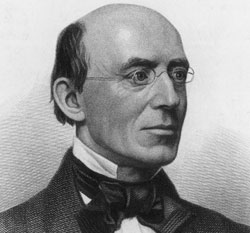
William Lloyd Garrison
Garrison, who is usually remembered as an abolitionist in his opposition to slavery, referred to himself as a Christian anarchist, envisioning the church triumphant as the proper governing body for all men. He urged the abolition of political states and opposed great accumulations of wealth - a position he viewed as essential to the Christian theme. Neither man favored a position of rulerlessness, preferring to support the view of man as a creature under the control of Christian authority. Both frowned upon interest, capital accumulations, profits, and personal luxury.
Nihilist Anarchists
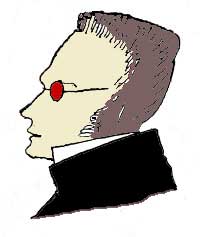
Max Stirner
The best known writer whose views led to the development of nihilist anarchy is Max Stirner (1806–1856). Possibly there is no more inspiring writer in the field of the ego triumphant than this German anarchist. Stirner, in his writings, would permit nothing to be valued above the individual's own ego. He did not oppose private ownership of property. But he advocated the taking of as much property as any individual was capable of taking.[20] His words, if they can be accepted at face value, indicate that he was not opposed to theft; that no one would ever have more property than he was competent to keep in the face of others who were trying to grab it, so the individual should grab all he wanted for himself. He was not opposed to a temporary union
with others who would help him grab. But he would remain in the union
only so long as it pleased him.
Stirner denounced morality.[21] He wanted no moral rules of any kind imposed upon any individual. Thus, in practice, a contract would never really be binding in Stirner's world. For while the individual might enter into a contract, he would remain bound by it only so long as he felt it advantageous. Thus, if his values shifted and he obtained a new objective, he would feel entirely justified in violating any prior commitment.
From Stirner, and a few others who took this view, there arose a school of thought called nihilism. It was particularly notable in Russia. The sum and substance of the nihilistic vieew was essentially that humanity had gotten off the track so far in its civilizing procedures that the only valid course would be to eliminate all known human institutions: state, church, school, business, family. Destruction for its own sake, as a palliative or purge, was viewed as virtuous. (¶ 81)
While Stirner is not generally classed as a nihilist, his writings helped to pave the way for the development of this school of thought and I classify him as a nihilistic anarchist. His best known work is The Ego and His Own. In it he begins by denouncing all good causes: the cause of God, the cause of mankind, the cause of truth, the cause of freedom, the cause of humanity, the cause of justice, the cause of my people,
the cause even of the mind. He ends his message by stating: All things are nothing to me.
[22]
Summation
This view of the anarchist branch of socialism is brief. There are many well-known anarchists who have been passed by, because the purpose of this work is not to systematize or exhaust the area, but to show that autarchy (self-government) is contrary in major respects to anarchy.
Thus, anarchy is a branch of socialism, whereas autarchy is not. Socialism is always discernible at a single point, intervention in the economy. The autarchist is content to permit the market place to make its own adjustments or revisions, if and when they are needed. He favors human liberty; he believes in property as a total concept, favors moral fulfillment of contracts, and supports profits, rents, and interest without equivocation.
As both the union anarchists and the Georgist individualist anarchists have demonstrated, economic reform with no state assistance whatever is probably impossible. Thus, the position of the anarchist is internally in conflict. The reduction of the state, either in whole or in major portions, is unquestionably meritorious and many of the anarchists have provided magnificent arguments in support of this reduction. However, their protestations are perpetually marred by their primary ambition, the revision of the economy and the wiping out of laissez-faire capitalism, in whole or in part.
I have often been inspired and delighted with writings by some of the anarchists when they confine themselves to the political arena. I am distressed and dismayed when they view morality, wealth, money, profits, rents, interest, land ownership, or a voluntary organization as inimical to freedom.
Economic freedom is the implicit right of any individual to own any kind or any amount of property and to unite voluntarily with others for purposes which relate to property in any particular. Impositions by any agency of force, regardless of the end in view, are essentially contrary to freedom. If one believe in freedom, one must believe in economic freedom - full latitude of choice in any and all economic areas, for each person. This can never be accomplished by any procedure, organized or otherwise, which uses violence (even the violence implicit in taxation) to take from an owner anything which is rightfully his.
Nor can one support arguments which are offered within a voluntaryist framework which would lead to controls of an extra-market character imposed at any point of market participation.
Support of freedom is essentially support of self-government in all particulars. Freedom is autarchy - self rule.
Notes
- Encyclopaedia Britannica, 1959 ed., Vol. I, 873.
- Ibid.
- Ibid.
- Ibid., p. 877.
- Gazette Telegraph (Colorado Springs), January 8, 1956, Sec. E, p. 4.
- James J. Martin, Men Against the State (New York: Libertarian Book Club, Inc., 1957), pp. 2, 3.
- Anarchism, n. 1. The theory that all government is an evil. Proudhon (1809-65),
Father of Anarchism,
advocated a social organization based on common ownership and free agreements. At its worst, anarchism stands for terroristic resistance to all present government and social order. 2. Advocacy or practice of anarchistic principles, esp., anarchistic revolution; nihilism; terrorism.Anarchy, n. 1. The state of society where there is no law or supreme power; a state of political disorder. 2. A state of disorder or confusion. Syn. Anarchy, chaos, lawlessness mean a breakdown in law or order. Anarchy implies total absence of or suspension of government; chaos, the utter negation of law or order; lawlessness, a prevalent or habitual disregard of law or order.
Webster's New Collegiate Dictionary (Springfield, Mass.: G. & C. Merriam Co., 1961.) ↩ - Lane, The Discovery of Freedom (New York: The John Day Company, 1943), p. xi.
- Autarchy, n. Absolute sovereignty; autocratic rule. Op. cit.
- Martin, op. cit., p. 173.
- Ibid., p. 191.
- Rocker, Pioneers of American Freedom (New York: J. J. Little & Ives Company, 1949), p. 86.
- Ibid., pp. 87–88.
- Martin, op. cit., p. 170.
- Ibid., pp. 192–201.
- Charles T. Sprading, Liberty and the Great Libertarians (Los Angeles: Golden Press, 1913), pp. 351–352.
- Ibid., p. 328.
- ... the first step in the revolution by the working class is to raise the proletariat to the position of ruling class, to win the battle of democracy. Marx, The Communist Manifesto (Gateway ed.; Chicago: Henry Regnery Company, 1954), p. 54.
- V. I. Lenin, State and Revolution (
Little Lenin Library,
XIV [New York: International Publishers, 1932]), p. 15, from Friedrich Engels, Anti-Dühring, London and New York, 1933. - he conflict over the
right of property
wavers in vehement commotion. The Communists affirm thatthe earth belongs rightfully to him who tills it, and its products to those who bring them out.
I think it belongs to him who knows how to take it, or who does not let it be taken from him, does not let himself be deprived of it. If he appropriates it, then not only the earth, but the right to it too, belongs to him. The Ego and His Own, ed. James J. Martin (New York: Libertarian Book Club, 1963), p. 191. - I am entitled to murder if I myself do not forbid it to myself, if I myself do not fear murder as a
wrong.
... There is no right outside me. If it is right for me, it is right. Possibly this may not suffice to make it right for the rest; that is their care, not mine: let them defend themselves. And if for the whole world something were not right, but it were right for me, that is, I wanted it, then I would ask nothing about the whole world. So every one does who knows how to value himself, every one in the degree that he is an egoist; for might goes before right, and that - with perfect right. Ibid., p. 190. - Ibid., pp. 3, 366.